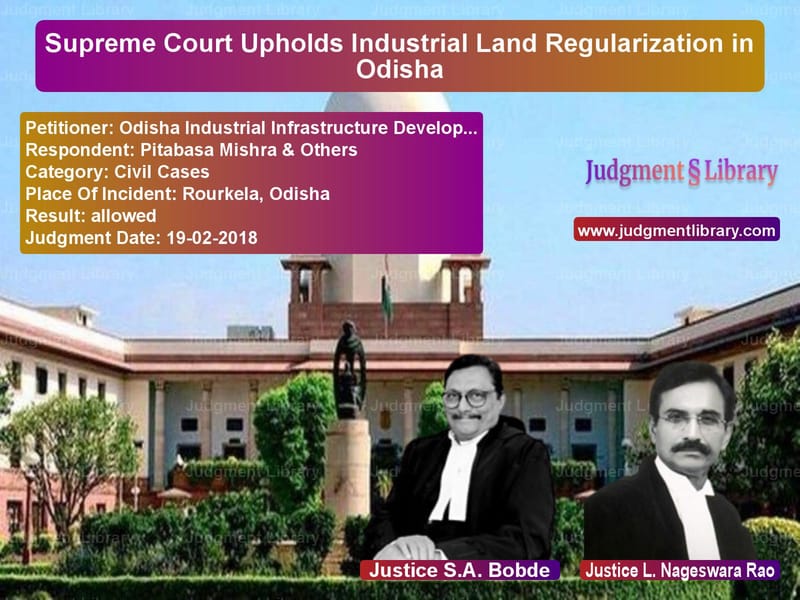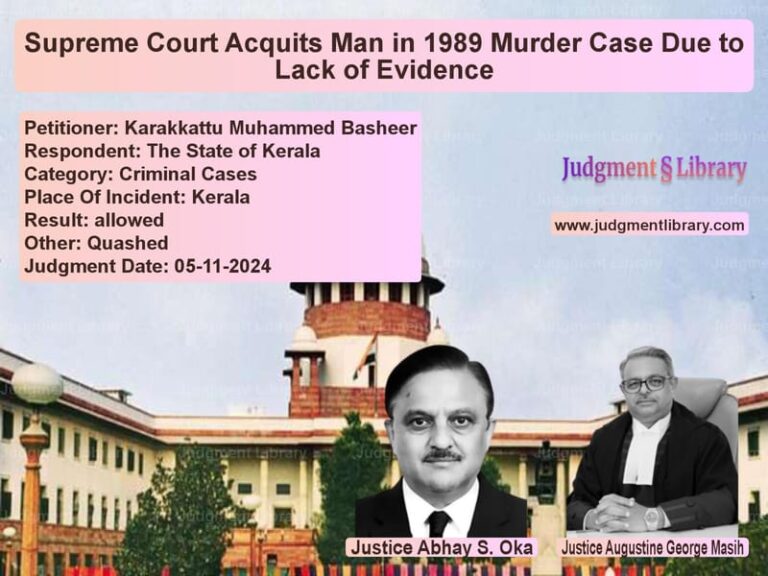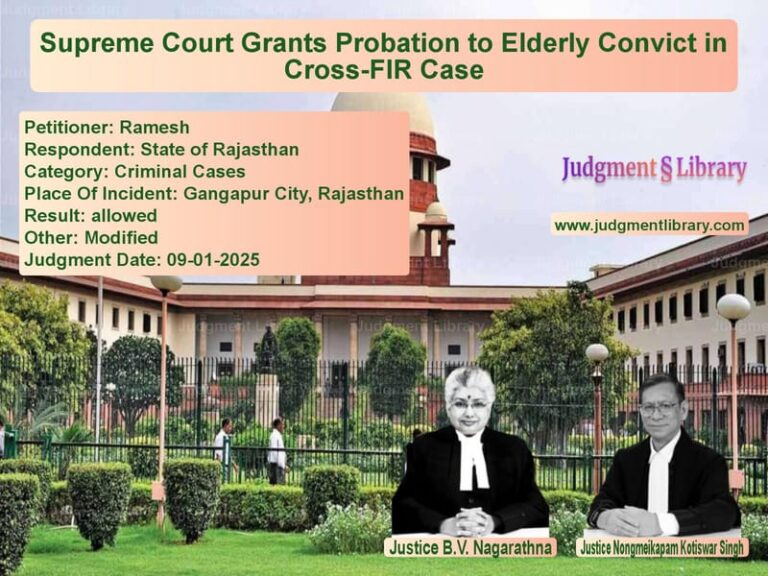Supreme Court Upholds Industrial Land Regularization in Odisha
The Supreme Court of India recently delivered a crucial judgment in the case of Odisha Industrial Infrastructure Development Corporation Limited vs. Pitabasa Mishra & Others. The ruling upheld the regularization of an industrial plot in Rourkela, Odisha, rejecting the High Court’s decision that had annulled the allotment. The Court clarified that land regularization was legally permissible and did not require prior public auction.
Background of the Case
The dispute arose when M/s Sai Sankar Associates (Respondent No. 7) was found to be an unauthorized occupant of 6300 square feet of industrial land in the Commercial Estate of Rourkela. The firm had been operating a small-scale industry since 1996 and had repeatedly sought regularization of its occupation. However, the Odisha Industrial Infrastructure Development Corporation (IDCO) failed to address the request for years.
In 2008, the High Court of Orissa directed IDCO to consider the request for regularization. Following this, the 74th Board Meeting of IDCO approved the regularization at a price of Rs. 7,89,350. However, nearby shop owners (Respondents 1-6) filed a writ petition, challenging the regularization on multiple grounds.
Arguments Presented
Petitioners’ Arguments (IDCO and Sai Sankar Associates)
- Regularization was done in accordance with prevailing policies.
- The land was part of government-owned land transferred to IDCO, not acquired under the Land Acquisition Act.
- The plot was allotted at an auction-based rate of Rs. 54,44,000 per acre, which was higher than the concessional industrial rate of Rs. 18,21,000 per acre.
- The protesting shop owners themselves had received encroachment regularization at concessional rates in 2006, making their objections hypocritical.
Respondents’ Arguments (Nearby Shop Owners)
- The allocation violated Section 33 of the Odisha Industrial Infrastructure Development Corporation Act, which mandates public auction for disposal of surplus land.
- Regularization was unlawful in the absence of specific regulations under Section 32.
- Industrial activity by Sai Sankar Associates would harm the business environment and pollute the area.
- The land was undervalued, with a market worth of Rs. 2 crores, but was allocated for just Rs. 7.89 lakhs.
Supreme Court’s Key Observations
1. Government Land vs. Acquired Land
The Court clarified that the land in question was government-owned and leased to IDCO for industrial development. Since it was not acquired under the Land Acquisition Act, Section 33 did not apply. Instead, IDCO’s actions were governed by Section 32 of the Odisha Industrial Infrastructure Development Corporation Act.
2. Absence of Regulations Does Not Prohibit Regularization
Rejecting the High Court’s ruling, the Supreme Court held that absence of regulations under Section 32 did not prevent IDCO from regularizing land. The Court cited multiple precedents affirming that statutory authorities can function even without specific regulations.
3. No Mandatory Requirement for Public Auction
The Court reiterated that public auction is not the only permissible method for land allotment. Regularization of long-standing industrial units was a valid policy decision, provided it aligned with statutory objectives.
4. Allotment Price Was Justified
The price of Rs. 7,89,350 was based on the last auction rate for similar plots, ensuring fairness. The Court also dismissed the respondents’ market valuation claim as speculative and irrelevant to industrial allotment policies.
Final Judgment
The bench, comprising Justice S.A. Bobde and Justice L. Nageswara Rao, ruled in favor of IDCO and Sai Sankar Associates, setting aside the High Court’s judgment. The Supreme Court emphasized that:
- Regularization of industrial plots was legally valid under Section 32.
- Public auction was not a necessary precondition for such regularization.
- The price set for the plot was reasonable and policy-compliant.
- Protesting shop owners had no legal standing, as they themselves had benefited from similar regularization earlier.
Conclusion
The judgment reinforces the principle that industrial development policies must be interpreted pragmatically. By validating IDCO’s decision, the Supreme Court ensured that procedural delays or regulatory gaps do not unfairly penalize legitimate industrial enterprises. This ruling sets an important precedent for industrial land allocation in India, clarifying that regulatory absence does not automatically render administrative actions illegal.
Petitioner Name: Odisha Industrial Infrastructure Development Corporation LimitedRespondent Name: Pitabasa Mishra & OthersJudgment By: Justice S.A. Bobde, Justice L. Nageswara RaoJudgment Date: 19-02-2018
Don’t miss out on the full details! Download the complete judgment in PDF format below and gain valuable insights instantly!
Download Judgment: Odisha Industrial In vs Pitabasa Mishra & Ot Supreme Court of India Judgment Dated 19-02-2018.pdf
Direct Downlaod Judgment: Direct downlaod this Judgment
See all petitions in Property Disputes
See all petitions in Landlord-Tenant Disputes
See all petitions in Specific Performance
See all petitions in Judgment by S. A. Bobde
See all petitions in Judgment by L. Nageswara Rao
See all petitions in allowed
See all petitions in supreme court of India judgments February 2018
See all petitions in 2018 judgments
See all posts in Civil Cases Category
See all allowed petitions in Civil Cases Category
See all Dismissed petitions in Civil Cases Category
See all partially allowed petitions in Civil Cases Category







